Physical Address
304 North Cardinal St.
Dorchester Center, MA 02124
Physical Address
304 North Cardinal St.
Dorchester Center, MA 02124
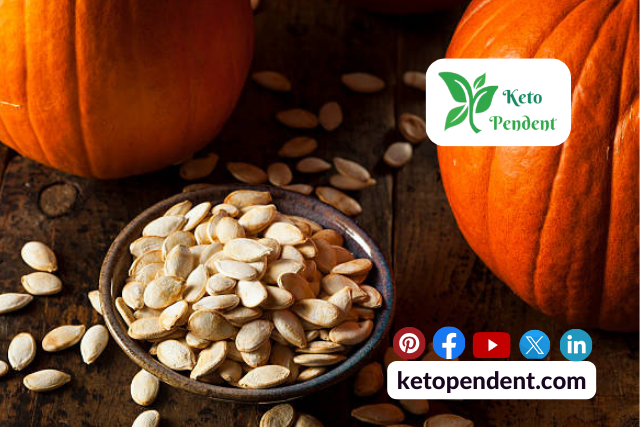

People often ask if pumpkin seeds are okay for a keto diet. So, they want to know “Are pumpkin seeds keto from all aspects?” Pumpkin seeds have some carbs, so keto folks need to know this.
Yes, pumpkin seeds are keto-friendly but not in all cases. that’s what I will discuss.
And, don’t forget to know about the pumpkin seeds keto recipe in today’s discussion.
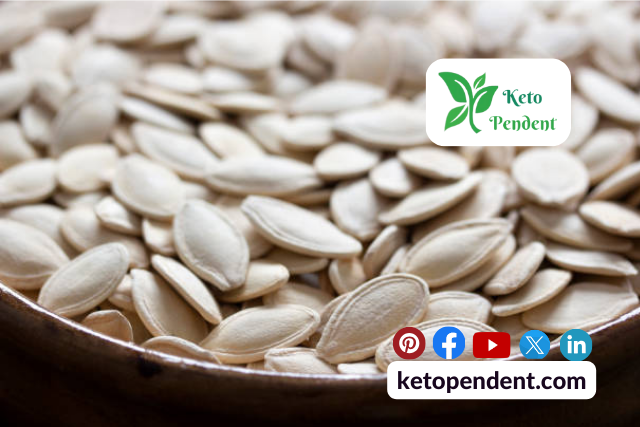
Yes, pumpkin seeds are keto-friendly. But, it varies from situation to situation. For instance, people with any allergy or disease need to avoid it. Although, pumpkin seeds are a nutrient-dense snack that can be included in a ketogenic (keto) diet.
Pumpkin seeds, also known as pepitas, are low in carbs and high in healthy fats, making them a suitable choice for those following a keto lifestyle.
Pumpkin seeds are rich in essential nutrients, including magnesium, zinc, and healthy fats. They also provide a good amount of protein and fiber, which can help support satiety and maintain stable blood sugar levels—both important factors in a ketogenic diet.
However, as with any food on the keto diet, it’s essential to be mindful of portion sizes, as overconsumption of even low-carb foods can affect ketosis. Incorporating pumpkin seeds in moderation as a snack or adding them to salads and dishes can be a nutritious and keto-friendly choice.
Now, there’s a big question—how to use it for optimal health and the perfect combination with other foods?
But first, let’s understand the requirements of the keto diet. A superb nutrition for health and fitness.
It will help you understand pumpkin seeds’ efficacy in the keto diet.
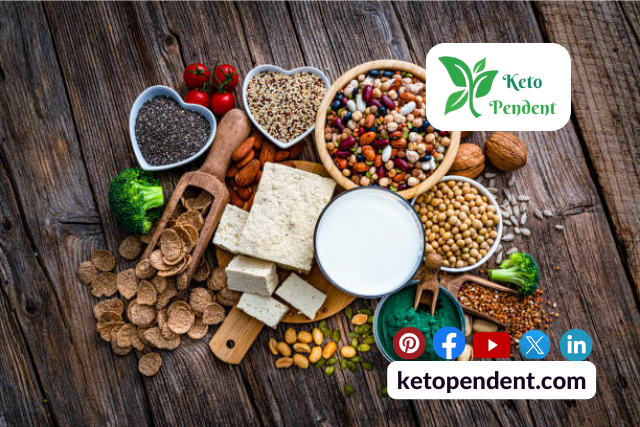
The ketogenic diet— keto diet, is a high-fat, low-carbohydrate diet designed to induce a state of ketosis in the body. Ketosis is a metabolic state where the body predominantly uses fat for fuel instead of carbohydrates.
The primary goal of the keto diet is to shift the body’s energy source from glucose (derived from carbohydrates) to ketones (produced from the breakdown of fats).
Using Less Sugar: When you eat fewer foods with sugar (carbohydrates), your body runs out of stored sugar (glycogen). This usually happens after a few days of not eating many carbs.
Switching to Ketosis: As your stored sugar goes down, your body starts breaking down fats into something called ketones in the liver. These ketones become the main way your body and brain get energy.
More Fat Burning: In this special state called ketosis, your body gets really good at burning fat for energy. This can help you lose more fat, which is why a lot of people like the keto diet for losing weight.
Eating the right kinds of foods is important on the keto diet. Here are some foods you can enjoy:
Before starting the keto diet, it’s crucial to consult with a healthcare professional or a registered dietitian to ensure it aligns with individual health goals and needs.
One more thing, I recommend regular medical monitoring, especially for those with underlying health conditions.
Now let’s come to the point. Are pumpkin seeds Keto, and what does it contain?
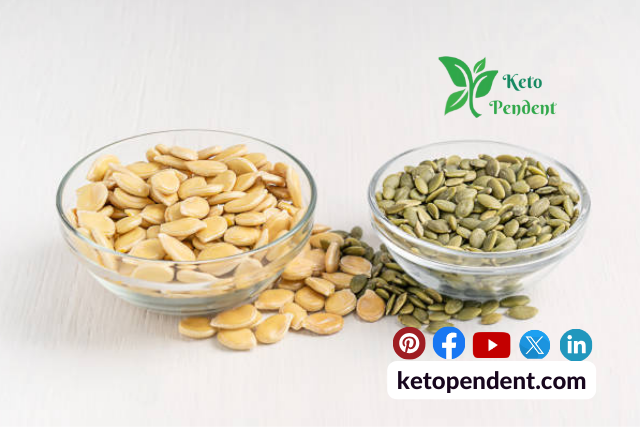
Now, understanding the ingredients of pumpkin seeds will help you understand the Keto Diet Requirements.
Types of Pumpkin Seeds
There are several types of pumpkin seeds, each with unique characteristics. Here are some common types:
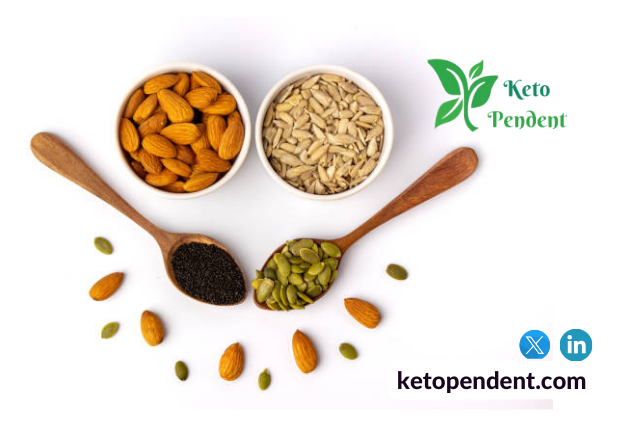
Serving Size 3 Tbsp
Pumpkin seeds, or pepitas, are packed with essential nutrients that align well with the goals of a keto diet:
Here are some ways to enjoy pumpkin seeds while following a keto diet:
Pumpkin seeds can be yummy on a keto diet, but here are some important things to remember:
Pumpkin seeds give your body good stuff and make for a tasty keto snack. They have healthy fats and other things that are good for you.
Remember to Mix it Up:
While pumpkin seeds are cool, it’s also important to eat different kinds of foods to get all the nutrients you need.
Ask a Pro:
If you have questions about your health or what to eat, it’s smart to talk to a doctor or someone who knows about food and health. They can help you figure out what’s best for you.
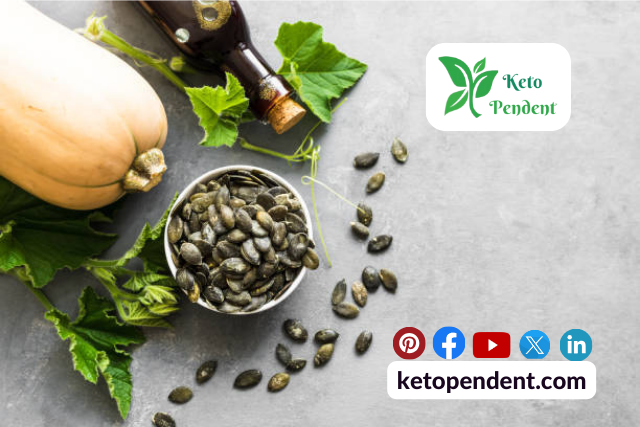
Pumpkin seeds can be a versatile and nutritious addition to various popular diets. Here’s how they fit into some of the most well-known dietary approaches:
Fit: Pumpkin seeds are high in healthy fats and low in carbohydrates, making them a suitable snack for those following a ketogenic diet. They contribute to the diet’s emphasis on fats for energy.
Fit: While not traditionally associated with the Mediterranean diet, pumpkin seeds can be incorporated as a nutrient-dense snack or salad topping, adding a plant-based source of protein and healthy fats.
Fit: Pumpkin seeds align well with the Paleo diet’s focus on whole, unprocessed foods. They provide a natural, nutrient-dense snack option similar to what early humans might have consumed.
Fit: Pumpkin seeds are an excellent plant-based source of protein, healthy fats, and essential nutrients, making them a valuable addition to vegetarian and vegan diets.
Fit: Pumpkin seeds are naturally gluten-free, providing a safe and nutritious snack option for individuals with gluten sensitivity or those following a gluten-free diet.
Fit: With their low carbohydrate content, pumpkin seeds are suitable for low-carb diets. They contribute to satiety and can be included in various low-carb recipes.
Fit: Pumpkin seeds are a nutrient-dense food, providing essential minerals, healthy fats, and protein. They can be part of a balanced and whole-foods-based approach to eating.
Fit: Pumpkin seeds are a plant-based protein source, making them suitable for individuals following a plant-based diet. They can be added to salads, smoothies, or enjoyed as a snack.
Fit: The antioxidants and omega-3 fatty acids in pumpkin seeds contribute to their anti-inflammatory properties, making them a beneficial addition to an anti-inflammatory diet.
Fit: Pumpkin seeds can be a satisfying and nutrient-dense snack for individuals aiming to manage their weight. The combination of protein, healthy fats, and fiber helps promote satiety.
Here are some easy and tasty ideas for including pumpkin seeds in your meals:
Remember:
Always be aware of how much you’re eating, especially if you’re following a specific diet plan. It’s also a good idea to think about what your body needs, and if you have any questions, talk to a healthcare professional or a nutritionist for advice personalized to you.
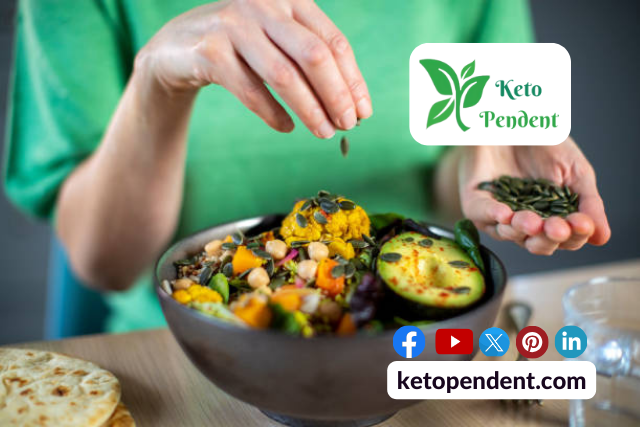
Pumpkin seeds are versatile and can be a valuable addition to various diets due to their nutritional content. Here are some diets for which pumpkin seeds can be beneficial:
Pumpkin seeds are an excellent plant-based source of protein, healthy fats, and essential nutrients, making them a valuable component for individuals following vegetarian or vegan diets.
Pumpkin seeds align with the principles of the Paleo diet, which emphasizes whole, unprocessed foods. They provide a nutrient-dense option for those following a Paleo lifestyle.
Pumpkin seeds are naturally gluten-free, making them a safe and nutritious choice for individuals with gluten sensitivity or those following a gluten-free diet.
While not traditionally associated with the Mediterranean diet, pumpkin seeds can be incorporated into this heart-healthy eating pattern, adding variety and nutrient density.
Pumpkin seeds are low in carbohydrates, making them suitable for low-carb and ketogenic diets. They contribute to satiety and provide essential nutrients without compromising carb restrictions.
Pumpkin seeds can be part of a diabetic-friendly diet due to their low glycemic index and potential benefits for blood sugar control. Protein and healthy fats also contribute to stable energy levels.
The anti-inflammatory properties of pumpkin seeds, attributed to their rich content of antioxidants and omega-3 fatty acids, make them suitable for inclusion in diets focused on reducing inflammation.
Pumpkin seeds can be a satisfying and nutrient-dense snack for individuals aiming to manage their weight. The combination of protein, healthy fats, and fiber helps promote satiety.
Pumpkin seeds are a convenient and portable source of energy, making them suitable for athletes and those with high-energy demands. The magnesium content also supports muscle function.
Pumpkin seeds can be a valuable addition to diets that prioritize a balance of whole, unprocessed foods. They bring a mix of essential nutrients to the table, including protein, healthy fats, vitamins, and minerals, thereby enhancing the overall nutritional content of meals.
Whether you sprinkle them on salads, blend them into smoothies, or enjoy them as a snack, incorporating pumpkin seeds supports optimal health by providing a diverse array of nutrients necessary for various bodily functions.
Their inclusion complements the wholesome nature of a balanced and varied eating pattern.
Let’s explore how pumpkin seeds can be beneficial in the context of different dietary perspectives:
Nutrient-Rich: Pumpkin seeds are a good source of essential nutrients like magnesium, zinc, iron, and healthy fats, which are important during pregnancy for the development of the baby.
Folate Content: Pumpkin seeds contain folate, a crucial nutrient for preventing neural tube defects in the developing fetus.
Rich in Healthy Fats: The omega-3 fatty acids in pumpkin seeds contribute to heart health by reducing inflammation and improving lipid profiles.
Blood Sugar Regulation: Pumpkin seeds’ fiber content may help regulate blood sugar levels, making them a suitable snack for individuals managing diabetes.
Satiety Factor: The combination of protein and healthy fats in pumpkin seeds can help enhance feelings of fullness during fasting periods.
Nutrient Density: Pumpkin seeds offer essential nutrients, ensuring that nutritional needs are met during eating windows.
Nutrient Boost: Pumpkin seeds can be a nutrient-dense addition to a child’s diet, providing essential minerals like magnesium and zinc for growth and development.
Snacking Option: Roasted and seasoned pumpkin seeds can be a healthy alternative to typical processed snacks.
Protein Source: Pumpkin seeds are a plant-based protein source, making them a valuable addition to plant-based diets.
Omega-3 Fatty Acids: Plant-based eaters can benefit from the omega-3 fatty acids found in pumpkin seeds.
Whole Food: Pumpkin seeds align with the whole-food focus of the Paleo diet, providing nutrients without the need for processing.
Caveman Snack: In its natural state, pumpkin seeds can be considered a snack similar to what early humans might have consumed.
Magnesium Content: Pumpkin seeds are rich in magnesium, which supports muscle and nerve function and aids in energy production.
Antioxidant Properties: The antioxidants in pumpkin seeds contribute to overall health by combating oxidative stress in the body.
It’s important to consider individual dietary needs, preferences, and any specific health conditions when incorporating pumpkin seeds into different diets.
While pumpkin seeds offer various health benefits, moderation, and balance are key in achieving a well-rounded and nourishing diet.
Always consult with healthcare professionals or registered dietitians for personalized dietary advice, especially during pregnancy or for individuals with specific health concerns.
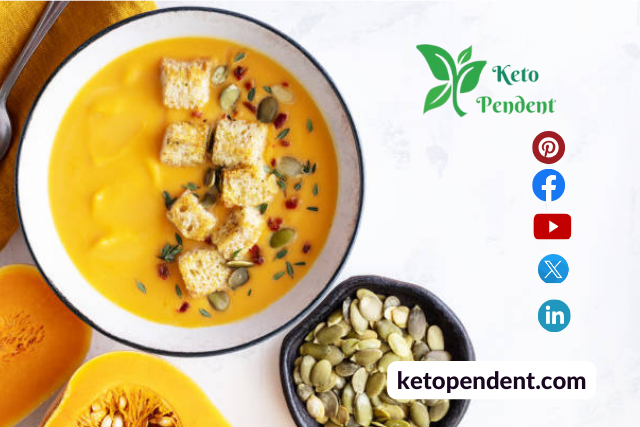
Here’s a simple and delicious pumpkin seeds keto recipe for you:
Enjoy your tasty and keto-friendly roasted pumpkin seeds!
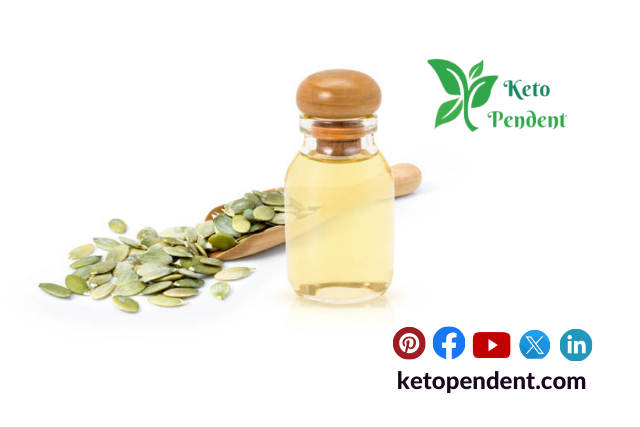
While pumpkin seeds are generally nutritious and beneficial for many people, there are certain conditions or situations where individuals should exercise caution or avoid them. Here are some considerations:
Seed Allergies: Individuals with seed allergies, including pumpkin seed allergies, should avoid consuming pumpkin seeds. Allergic reactions can range from mild symptoms like itching or swelling to severe reactions such as anaphylaxis.
Diverticulitis: In some cases, individuals with diverticulitis may be advised to avoid foods with small, hard particles, including seeds. However, the evidence on this association is not conclusive, and recommendations may vary.
Dental Issues: Pumpkin seeds are crunchy, and excessive consumption may pose a risk to individuals with dental issues, such as weak enamel or dental work. Chewing hard seeds might lead to tooth damage.
Blood Thinners: Pumpkin seeds contain vitamin K, which plays a role in blood clotting. Individuals taking blood-thinning medications may need to monitor their vitamin K intake, as sudden changes can affect medication efficacy.
Weight Management: While pumpkin seeds are nutrient-dense, they are also calorie-dense. Overconsumption without considering overall caloric intake can contribute to weight gain.
Kidney Stones: Pumpkin seeds are a source of oxalates, and individuals prone to kidney stones or with a history of oxalate-related issues may need to moderate their intake.
Latex Allergy: Individuals with latex allergies may experience cross-reactions with certain fruits and seeds, including pumpkin seeds. It’s advisable to exercise caution and consult with a healthcare professional.
Processed Seeds: Pre-packaged or processed pumpkin seeds may contain added sugars, salt, or other additives. Individuals with dietary restrictions or health concerns should check labels for unwanted ingredients.
Gastrointestinal Sensitivity: Pumpkin seeds contain fiber, and excessive consumption may cause gastrointestinal discomfort, especially for those with sensitive digestive systems.
Mold Sensitivity: Pumpkin seeds, like other seeds, can be susceptible to fungal contamination. Individuals with mold sensitivities should ensure the seeds are stored properly to minimize the risk.
It’s crucial for individuals with specific health conditions, allergies, or concerns to consult with a healthcare professional or a registered dietitian before making significant changes to their diet.
one more thing, moderation is key, and a varied, balanced diet that takes individual health considerations into account is the best approach for overall well-being.
Here are some concerns about “Are pumpkin seeds keto”:
Absolutely! If you’re on the keto train, pumpkin seeds are your buddies. They’re like the cool kids of snacks – low in carbs, high in healthy fats, making them a dream come true for anyone sailing through the ketogenic lifestyle.
Now, let’s talk about bringing these little champs into your keto world. Crunch on them as a snack when you’re feeling peckish, sprinkle them over salads for a nutty twist, blend them into your morning smoothie for extra goodness, or toss them into your favorite keto recipes.
Pumpkin seeds are like superheroes that can adapt to any keto adventure.
But, wait a minute! Don’t let the excitement lead to a pumpkin seed party binge. Even though they’re keto-approved, it’s a ‘watch your portions’ deal.
Too much, even of the good stuff, can shake up your daily calorie plans. Keep it in check, enjoy it in moderation, and let the keto goodness flow!
Let’s Talk Pumpkin Seeds and Keto!
Okay, time to sum up our pumpkin seeds keto adventure! Drumroll, please! Pumpkin seeds are like the superheroes of keto – they fit right into low-carb and high-fat diets. Today’s chat showed that these little wonders can team up with different eating plans like vegetarian, Paleo, and gluten-free.
We’ve dived into the perks of adding pumpkin seeds to your meals. They’re like tiny powerhouses for balanced and whole-food diets. But, here’s the hero’s warning: if you have allergies, dental stuff, or specific health things, be cautious.
Remember, it’s all about balance and knowing what’s best for you. So, enjoy those pumpkin seeds in moderation! And hey, a keto-friendly pumpkin seeds recipe is on the horizon. Exciting, right? Stay tuned for more keto goodness coming your way!